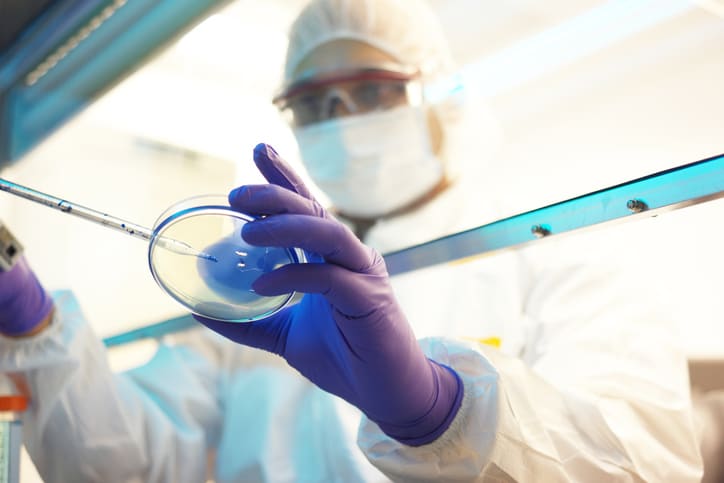Gastrointestinal Surgery
Precision Care and Improved Outcomes
Surgery can be a critical part of treating gastrointestinal cancer. At the Providence Swedish Cancer Institute, our experienced surgeons use advanced techniques — including robotic-assisted and minimally invasive procedures — to deliver precise care that improves outcomes, reduces side effects, and lowers the risk of recurrence.

A Focus on Confidence & Compassionate Care
Gastrointestinal (GI) cancer surgery isn’t just about removing a tumor — it’s about preserving function, minimizing side effects and improving your quality of life. The right procedure makes a difference in your recovery, your long-term health, and how you feel moving forward.
At the Providence Swedish Cancer Institute, we offer innovative surgical options, all designed to provide the best possible outcome with the least disruption to your life. We were one of the first in Puget Sound to offer HIPEC, a surgical procedure that involves treating certain GI cancers with a heated chemotherapy solution that is circulated directly into the abdominal area. But surgery is just one step in your journey. We also provide comprehensive, ongoing support — including cancer rehabilitation, ostomy care, and genetic counseling — so you can heal with confidence and regain strength.
Advanced Gastrointestinal Surgery
We offer advanced, minimally invasive gastrointestinal surgeries, from laparoscopic and robotic techniques to highly specialized options like HIPEC and TAMIS. Surgical options include:
Other GI cancer surgeries
Abdominoperineal resection removes the anus, rectum, and part of the colon — often to treat cancer in the lower rectum when other treatments aren’t an option. It may be performed using an open, laparoscopic, or robotic approach. While it requires a permanent colostomy, this surgery can effectively remove cancer and reduce recurrence.
An appendectomy may be necessary if cancer is found in the appendix or if tumors are discovered during imaging or surgery. Removing the appendix can help prevent the spread of cancer cells and allow for further evaluation and treatment. This procedure is also commonly used to treat appendicitis, when the appendix becomes inflamed or infected. Most appendectomies are minimally invasive, using small incisions to reduce pain and speed recovery.
Cholecystectomy is the surgical removal of the gallbladder, often used to treat gallbladder cancer. Most procedures are minimally invasive, using small laparoscopic incisions to reduce pain, lower complication risks, and speed recovery. For patients with cancer, removing the gallbladder can help prevent its spread and allow for more targeted follow-up treatment.
Coloanal anastomosis using total mesorectal excision is surgery to attach the colon to the anus. This procedure is often used to treat lower rectal cancer while preserving normal bowel function. It can help patients maintain a more natural way of passing stool.
Complex reconstruction with the colon and small bowel restores the digestive tract after a bowel resection. It helps rebuild continuity in the intestines and restore normal gastrointestinal function so you can digest food more effectively and comfortably, which improves your overall quality of life after surgery.
A distal gastrectomy removes cancer from the lower part of the stomach. In some cases, a portion of the small intestine is also removed to ensure all affected tissue is removed.
This procedure can help relieve symptoms, improve digestion, and support long-term recovery.
Endoscopic surgery is a procedure to remove, biopsy, or examine tumors. Your surgeon performs the procedure with the help of a tiny camera that enters the body through a small opening or incision in your body.
The procedure generally involves a shorter hospital stay or can be performed in an outpatient setting. It allows the surgeon to use smaller instruments and move with greater precision, which results in a less traumatic experience and quicker recovery for the patient.
Esophageal cancer may be treated with either minimally invasive or open surgery, depending on the tumor’s size, location, and complexity. Minimally invasive and robotic-assisted approaches use small incisions and a camera for precision and quicker recovery. In more complex cases, open surgery may be needed to remove cancerous tissue and restore swallowing function using tissue from the stomach or intestines.
What to Expect
About a week before surgery, we'll schedule a pre-admission visit to:
- Assist with any remaining pre-surgical lab work or tests
- Review what will happen during your surgery
- Explain potential side effects
- Discuss medications and post-surgery care, including in-home help or equipment if needed
You'll receive information to prepare for your hospital admission. If you have any questions after your pre-admission appointment, you can reach out to your nurse or care coordinator, who will be happy to help.
On the day of your surgery, you will meet with an anesthesiologist, who confirms details of your medical record, clarifies any questions about your medical history, and performs a physical exam.
During this time, you can discuss the plan for your care, express any concerns about potential side effects, and ask any questions that you have about the anesthesia.
The specifics of your surgery are determined by your surgery type and individual needs, but one factor is always consistent – you’re being treated by an expertly trained team of surgeons, anesthesiologists, surgical nurses, and technicians.
The length of your surgery depends on several factors, including the type of procedure, whether reconstruction is being done, and the complexity of the procedure. The care team will inform your loved ones of your progress and provide updates during surgery.
Following surgery, you’ll be moved to recovery where your care team can monitor your vital signs and manage your pain as the anesthesia wears off.
Postoperative care instructions will be provided before being discharged. Instructions could include information about wound care, activity restrictions, and pain management.
For more extensive surgeries, you may be required to stay overnight, or longer, to ensure proper recovery.
Typically, you'll have follow-up appointments after surgery for the first few weeks. This is to monitor your healing and effectively manage the potential for complications. Your follow-up appointment schedule will depend on the type of surgery you have.
As time goes on, we'll see you less frequently, but you'll still come in for regular checkups. During these visits, we manage any ongoing treatments, such as medical or radiation oncology, and monitor for signs of recurrence.
We also offer extensive supportive care services to help you through every treatment stage.
Learn more about our supportive care services.
Frequently Asked Questions
It’s natural to feel nervous about surgery, but your care team will talk you through the process, helping you prepare for surgery and answering all your questions well in advance.
As part of your personalized care plan, we offer advanced surgical options tailored to your diagnosis and goals, including minimally invasive procedures, when possible, along with reconstruction if needed. After surgery, we provide detailed recovery instructions and make sure that you have all the ongoing support you need to help you heal with confidence.
Surgery may be all that your care plan requires if your cancer was diagnosed in its early stages and hasn’t spread to other parts of the body.
However, surgery can be accompanied by medical oncology treatment such as chemotherapy, immunotherapy, hormone therapy and targeted therapy to meet your specific needs and give you the highest likelihood of a successful outcome.
Radiation may also be recommended to help shrink tumors prior to surgery or following surgery to decrease the chance of recurrence.
Your recovery time depends on which type of surgery you have.
You may be in the hospital for one or two days following your surgery, although some procedures are done on an outpatient basis. Some patients can return to their regular activities within a few weeks, while others may take longer.
Before surgery, your care team will walk you through what to expect and provide a detailed recovery plan. This includes guidance for managing pain, any activity restrictions, and information about follow-up visits — so you can make arrangements and feel confident going into surgery.
Treatment timelines vary depending on your diagnosis. Some surgical procedures are done on an outpatient basis. More complex cases may require a hospital stay.
Medical oncology and radiation treatments typically involve multiple treatment sessions over a period of days or weeks. Treatment timelines vary depending on the type and stage of your cancer. Your care team reviews your treatment plan with you, as well as any options that may impact length, frequency and duration of treatment.
Following active treatment, you will see your physician periodically to monitor any signs of recurrence.
There’s no one-size-fits-all diet during cancer treatment but eating well can help you feel stronger and support your recovery. Many people find it helpful to focus on small, balanced meals with plenty of protein, fruits, vegetables, and whole grains. A Providence Swedish Cancer Institute nutritionist can help you find foods that work for your needs, manage side effects like nausea or appetite changes, and support your overall well-being throughout treatment.
Getting a second opinion can help you feel more confident in your diagnosis and treatment plan. If you’ve already been diagnosed somewhere else, we’re here to help you take the next step. Call 855-XCANCER, 855-922-6237 - our care coordinators will match you with the right cancer specialist and help schedule your visit. They can also work with your current physician to collect your medical records and test results.
We provide a full range of supportive care services to support you during and after your cancer treatment. Some of these services include:
- Art therapists
- Cancer rehabilitation (onco-physiatry)
- Care coordinators
- Genetic counseling (cancer geneticist)
- Health educators
- Medical massage (edema, lymphedema management)
- Music therapist
- Naturopaths
- Nutritionists
- Oncology nurses
- Social workers
- Speech and language pathology
We can also help with finances, food, transportation, and other challenges for eligible patients through our patient assistance fund.
See the full list of supportive care services.
Note: Some services are provided by local partners and vary based on location. Please contact your clinic for more information.
News & Info From Our Experts





